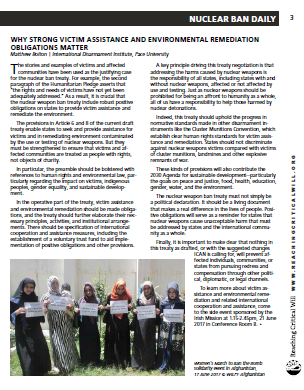 Matthew Bolton, director of Pace University’s International Disarmament Institute, published the following op-ed in the Nuclear Ban Daily on 21 June, regarding positive obligations in the Nuclear Weapons Ban Treaty, currently being negotiated at the UN in New York. For more a detailed report on his research regarding positive obligations, click here.
Matthew Bolton, director of Pace University’s International Disarmament Institute, published the following op-ed in the Nuclear Ban Daily on 21 June, regarding positive obligations in the Nuclear Weapons Ban Treaty, currently being negotiated at the UN in New York. For more a detailed report on his research regarding positive obligations, click here.
The stories and examples of victims and affected communities have been used as the justifying case for the nuclear ban treaty. For example, the second paragraph of the Humanitarian Pledge asserts that “the rights and needs of victims have not yet been adequately addressed.”
As a result, it is crucial that the nuclear weapon ban treaty include robust positive obligations on states to provide victim assistance and remediate the environment. The provisions in Article 6 and 8 of the current draft treaty enable states to seek and provide assistance for victims and in remediating environment contaminated by the use or testing of nuclear weapons.
But they must be strengthened to ensure that victims and affected communities are treated as people with rights, not objects of charity. In particular, the preamble should be bolstered with references to human rights and environmental law, particularly regarding the impact on victims, indigenous peoples, gender equality, and sustainable development.
In the operative part of the treaty, victim assistance and environmental remediation should be made obligations, and the treaty should further elaborate their necessary principles, activities, and institutional arrangements. There should be specification of international cooperation and assistance measures, including the establishment of a voluntary trust fund to aid implementation of positive obligations and other provisions.
A key principle driving this treaty negotiation is that addressing the harms caused by nuclear weapons is the responsibility of all states, including states with and without nuclear weapons, affected or not affected by use and testing. Just as nuclear weapons should be prohibited for being an affront to humanity as a whole, all of us have a responsibility to help those harmed by nuclear detonations.
Indeed, this treaty should uphold the progress in normative standards made in other disarmament instruments like the Cluster Munitions Convention, which establish clear human rights standards for victim assistance and remediation. States should not discriminate against nuclear weapons victims compared with victims of cluster munitions, landmines and other explosive remnants of war.
These kinds of provisions will also contribute the 2030 Agenda for sustainable development—particularly the goals on peace and justice, food, health, education, gender, water, and the environment.
The nuclear weapon ban treaty must not simply be a political declaration. It should be a living document that makes a real difference in the lives of people. Positive obligations will serve as a reminder for states that nuclear weapons cause unacceptable harm that must be addressed by states and the international community as a whole.
Finally, it is important to make clear that nothing in this treaty as drafted, or with the suggested changes ICAN is calling for, will prevent affected individuals, communities, or states from pursuing redress and compensation through other political, diplomatic, or legal channels.
